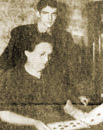No mother had more at stake in the war than widow Esther McCabe, whose 11 sons all served overseas.
by Hugh Conrad
Esther McCabe had 12 children. That was a lot, even in the 1940s. But it wasn’t what really made her stand out—nor was the fact that 11 of her children were boys, or that she raised them alone. Her claim to fame was that all 11 of her sons were in the military in World War II. It didn’t take long for all of America to find out about that.
 McCabe’s first public recognition as the quintessential war mother came in 1943. It came during a gathering in Harrisburg, Pennsylvania, to support a war bond promotion by the Blue Star Mothers of America. McCabe shocked other attendees by naming her sons in the service (10 at that time), along with their ages and locations around the world. “I insist that my sons buy bonds, and I buy them myself whenever I can, for I feel that the war will be over that much quicker if we all help in every way possible,” she said. “I always did think the Blue Star Brigade was a fine organization, doing a good job, and I wanted to join for some time, but couldn’t get away before from my chores around the home and my letter writing.”
McCabe’s first public recognition as the quintessential war mother came in 1943. It came during a gathering in Harrisburg, Pennsylvania, to support a war bond promotion by the Blue Star Mothers of America. McCabe shocked other attendees by naming her sons in the service (10 at that time), along with their ages and locations around the world. “I insist that my sons buy bonds, and I buy them myself whenever I can, for I feel that the war will be over that much quicker if we all help in every way possible,” she said. “I always did think the Blue Star Brigade was a fine organization, doing a good job, and I wanted to join for some time, but couldn’t get away before from my chores around the home and my letter writing.”
On Mother’s Day the following year, when still a mere 10 of the McCabe boys were serving their country, the organization War Mothers in the United States named McCabe the Nation’s Number 1 Mother. Soon afterward, another McCabe signed up for service, and his mother earned the unique distinction of having 11 sons in the war. Eight were in the army, two in the navy, and one in the merchant marine. She also had a daughter, Alice, the sole remaining civilian of the bunch. Before long, McCabe received another award, Pennsylvania’s Number 1 War Mother, from the Pennsylvania Newspaper Publisher’s Association. Soon, she began appearing as a guest on regional and national radio shows.
 Like the family McCabe raised, the family she came from was a large one. Born in 1889, she was one of eight children of Thomas and Alice Scanlan, who lived on a slice of west-central Pennsylvania’s Washington Township that’s still known as Scanlan’s Hill. She and her sisters Ruth and Margaret were educated to be teachers, and she earned her teaching certification from Indiana Normal School (now Indiana University of Pennsylvania). After giving birth to her first son in 1909, however, she refocused her efforts from pursuing a career to raising a family.
Like the family McCabe raised, the family she came from was a large one. Born in 1889, she was one of eight children of Thomas and Alice Scanlan, who lived on a slice of west-central Pennsylvania’s Washington Township that’s still known as Scanlan’s Hill. She and her sisters Ruth and Margaret were educated to be teachers, and she earned her teaching certification from Indiana Normal School (now Indiana University of Pennsylvania). After giving birth to her first son in 1909, however, she refocused her efforts from pursuing a career to raising a family.
By the time the United States was drawn into World War II in December 1941, Esther had been raising her 12 children alone for eight years. Her husband, Emmett, a United Mine Workers organizer, had died in 1933 (he was hit by a train in what was ruled an accident, but which some suspected was foul play). McCabe stayed put in their house in the small coal town of Lilly, a few miles north of Scanlan’s Hill.
As a widow with a dozen kids, she relied on her family for support. The Scanlan garden, for example, was critical to feeding all those hungry mouths during the Depression in the 1930s. “They used to get a couple acres plowed every year,” said 81-year-old James McCabe, the only one of McCabe’s children who is still alive. “They would bring in a horse and plow to get the land ready. They had a real big garden and called it The Farm.”
James, who goes by Jim and resides in Glendale Heights, Illinois, appreciated the recognition his mother received during the war. “I was happy about it for my mother. I think that she deserved something,” he says. “She was a very good Catholic. I thought a lot of her. She was evidently pretty smart to be able to raise all of us. She was a great woman.”
Jim signed the papers to join the navy in 1943 and entered the service in 1944, still a few months shy of his 18th birthday. “When I was growing up, all of my friends’ fathers were in the service,” he says. “That is what you wanted to do. I thought that the war would be over before I could get in, so I joined a little bit before I had to.” After the war, Jim returned to Lilly to work in the coal mines, but after a short time, he decided that life on the seas was better than toiling underground. He re-enlisted in the navy and stayed for 20 years before settling in Illinois.
Jim’s brother Leo, it turned out, was a bona fide war hero, but no one in the family knew about it. Leo, who was known as Rusty, was an army corporal fighting in the European theater in 1944 and 1945. After the war, he returned to his hometown to settle down and raise six children. Like so many veterans, he was reluctant to discuss his wartime accomplishments. “We all got home from the war in one piece,” he said in an interview in 2004. “When we got home, we never talked about the war much. We just considered ourselves lucky to make it home alive.”
 When Leo died in 2007, his family found out about his heroics. Serving as a technician with an anti-aircraft artillery battalion, he fought in Normandy, Northern France, the Rhineland, the Ardennes, and Central Europe. He earned five Bronze Stars, the European–African–Middle Eastern Theater Service Medal, and the Distinguished Unit Badge. His heroics included pulling a man from a fire caused by enemy rockets. When his children were young, he never breathed a word about his wartime deeds. They never knew about their father’s medals. “Never once did he bring it up,” says Linda (McCabe) Ronan, Leo’s daughter, who lives in Ashville, Pennsylvania. “That is why we were so shocked when we found out about it.”
When Leo died in 2007, his family found out about his heroics. Serving as a technician with an anti-aircraft artillery battalion, he fought in Normandy, Northern France, the Rhineland, the Ardennes, and Central Europe. He earned five Bronze Stars, the European–African–Middle Eastern Theater Service Medal, and the Distinguished Unit Badge. His heroics included pulling a man from a fire caused by enemy rockets. When his children were young, he never breathed a word about his wartime deeds. They never knew about their father’s medals. “Never once did he bring it up,” says Linda (McCabe) Ronan, Leo’s daughter, who lives in Ashville, Pennsylvania. “That is why we were so shocked when we found out about it.”
With all 11 McCabe boys surviving the war (though two of them suffered emotional problems that haunted them until their deaths), World War II ended happily for Esther McCabe. She lived until 1971, still residing in her Lilly home, still caring for her two shell-shocked sons, and still unsurpassed by any other American mother in the number of sons contributed to wartime service. Jim McCabe can’t help but resort to a word he’s reluctant to use in describing his mother’s and his whole family’s wartime accomplishments: proud. “Sure, I was proud,” he says. “It was a pretty great thing. Nobody else did it.”
Copyright 310 Publishing, LLC. All rights reserved.



FOLLOW US »
